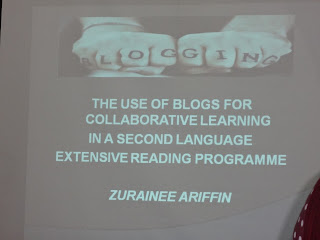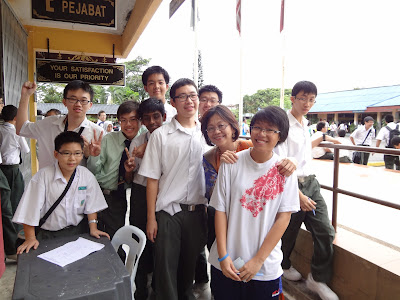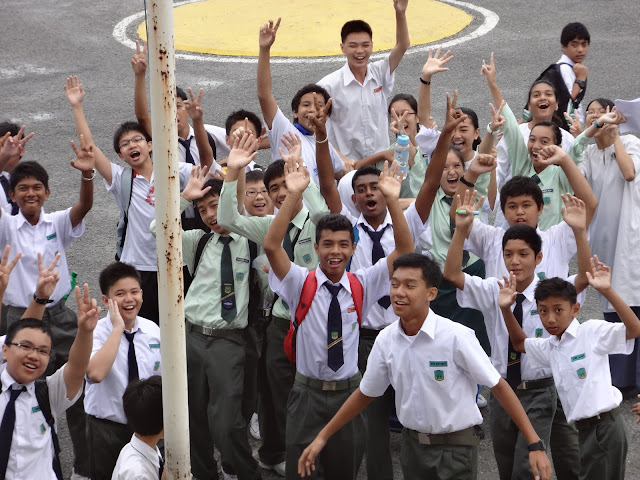Reframing English Language Education:
New Environments, New Needs, New Solutions
The 21st Melta Conference is my fourth participation in this annual event. Back then, it was compulsory for post graduate studies people to attend to gain brownie points ! This year I attended with an open mind, not bogged down by compulsion and it was a good feeling. Ha, all thanks to Prof. Dr. Kuldip Kaur for instilling this habit of reflection in journal writing.Why do you think I am still at it? They say old habits die hard; so get hooked at good ones and they haunt you for life.
6 of us from the school took the opportunity to learn, relearn and unlearn. We had fun chasing after one another in the mornings for the 2 days; it was either too early or too late but nevertheless we landed at the place in time for morning coffee. Riding with Doris is sure fun; she is a deft driver and she puts on the video to watch to while away traffic woes. This morning we had a laugh at '27 dresses'; all about clothes, meeting the right beaus and weddings.
Dr, G was endearly mentioned for her instrumental effort in the Melta Conferences. Where the learning of English is concerned in this country, she was never left out. My form teacher of Muar SAB and I learned 'Canterbury Tales' under her supervision.
The trend this year clearly emphasizes the need to reframe learning strategies in the teaching of English.
Teachers are advised to move in sync with the popular culture of the media.
Farhanaz Rabbani of Bangladesh ( I hope I got the place of origin right) reiterated that the Y generation went through differing times from the baby boomers' era and the challenge is to 'change' for them. It's either you are with them or you are out.So she suggested we embrace the digital media for teaching in the classroom. So we are to twit, blog, fb and name them.
I also heard from an X generation era representative defending the use of blogs to promote extensive reading in the classroom.From a rural set up, it is a challenge to her to instill reading habits. So she used the popular tool to get the students excited about reading. Students wrote on their reading experiences. I met her this morning again and gave her a new challenge. To what extent will this blogging effort sustain the reading habit among her protegees? Who will continue to monitor? She replied that she will try to start a phd attempt on this and allow this project to stretch for at least a year. Let's hope her interest will be sustained and her study replicated by others.
I also chanced upon this; Digital Writing: Motivating Learners to Write through a Digital Notebook by Rahmah Hj Sayuti of Johor . She gathered her students to respond to journal writings in the digital mode and with some success. Children like everyone else; loves new ideas, approaches and the digital media seems to attract interest. She has a great challenge though; she needed to go into every child's blog to block and unblock...I call it a challenge alright.
This popular culture also caught on in Dr. Lim Peck Choo's 'Coconstruction of knowledge during online collaboration'.She used Vygotsky's Scaffolding Theory and the peer group collaboration learning platform to conduct her study on the learning of Academic English. Apparently this online mode facilitated the effort of learning outside the 4 walls of the classroom. Her adult students find it convenient to go online for discussions, deliberations and concurrences.Some degree of success was achieved with the lower efficiency students attaining a higher degree of accomplishment. Her study reminded me of my own in 2004 where I used this very theory for group oral assessment in the classroom.
Then we had Sarapol Chirasawadi of Thailand speaking on ICT for Informal Education. He lamented that the level of English there was low and that L1 ( first language of users) was highly incorporated in the learning of English for the purpose of passing the Tesol tests among adult learners.He reiterated that it was a challenge to prepare these adults for the test especially in the absence of an immersion feature. Sometimes, we Malaysians should be thankful that English can be quite easily learned as are in a fully 'immersed' ethos inherited through the Colonial influence.
Sarapol also explained that he had to prepare content , videos, web sites suitable for learning among his adult learners and it is not an easy task.
Perhaps something that really caught my eye was this presentation by Rozita Dass of Singapore on 'Towards a Theory of How Students on Singapore Secondary Schools deal with Literature in English Studies'. Though English is the first language in schools on this island, the students in main stream schools do not have a keen interest in the subject. Many are not keen as the learning of this subject is not only challenging but also of 'no economic' value with it being connected to 'arty' careers and the teaching profession. Talking about prejudices.I have always affirmed that both the right and left brains ought to be developed simultaneously for full benefits !
When you read literature texts; it will reveal values like dignity, integrity, love, care, concern and meaningful relationships that cannot be truly explained otherwise.
Now you know why some adults are without feelings for others.
Rozita hopes that a new outlook will be given to the subject and that the learning of Literature will be incorporated into local dramas and performances. When the economic woes are gone; people will have more time to indulge in real living and appreciate it. When will it be? An illusion?
The Plenary session by Ruanni Tupas talks about the million dollar question on the role of of L1 use and English Language learning.To what extent can we allow L1 in the teaching of English in the classroom? His studies in the Philippines and Cameroon showed a positive correlation between the use of L1 instructional support and the learning of English. One of the participants cautioned that too much use of translation and L1 in the classroom may be a short term gain for a long term loss...food for thought.
I remember a personal experience in the learning of a foreign language in my undergraduate days.When I learnt Japanese under the tutelage of a Japanese teacher who knew almost no English, I was forced to learn the basics of the Japanese language without the L1 in the classroom and I really learnt better when I compared it to the experience the following year when some L1 was used by a lecturer who knew English. The moment we found out that she could speak English, we learnt Japanese with plenty of L1 support ... to our detriment. To me it was in fact a long term loss.
Well, I can only conclude that things work differently under different situations with a set of different learners.
Let the best be found ; in situ.
To Melta, thank you for a fresh revisitation of interest in academic papers.






















































